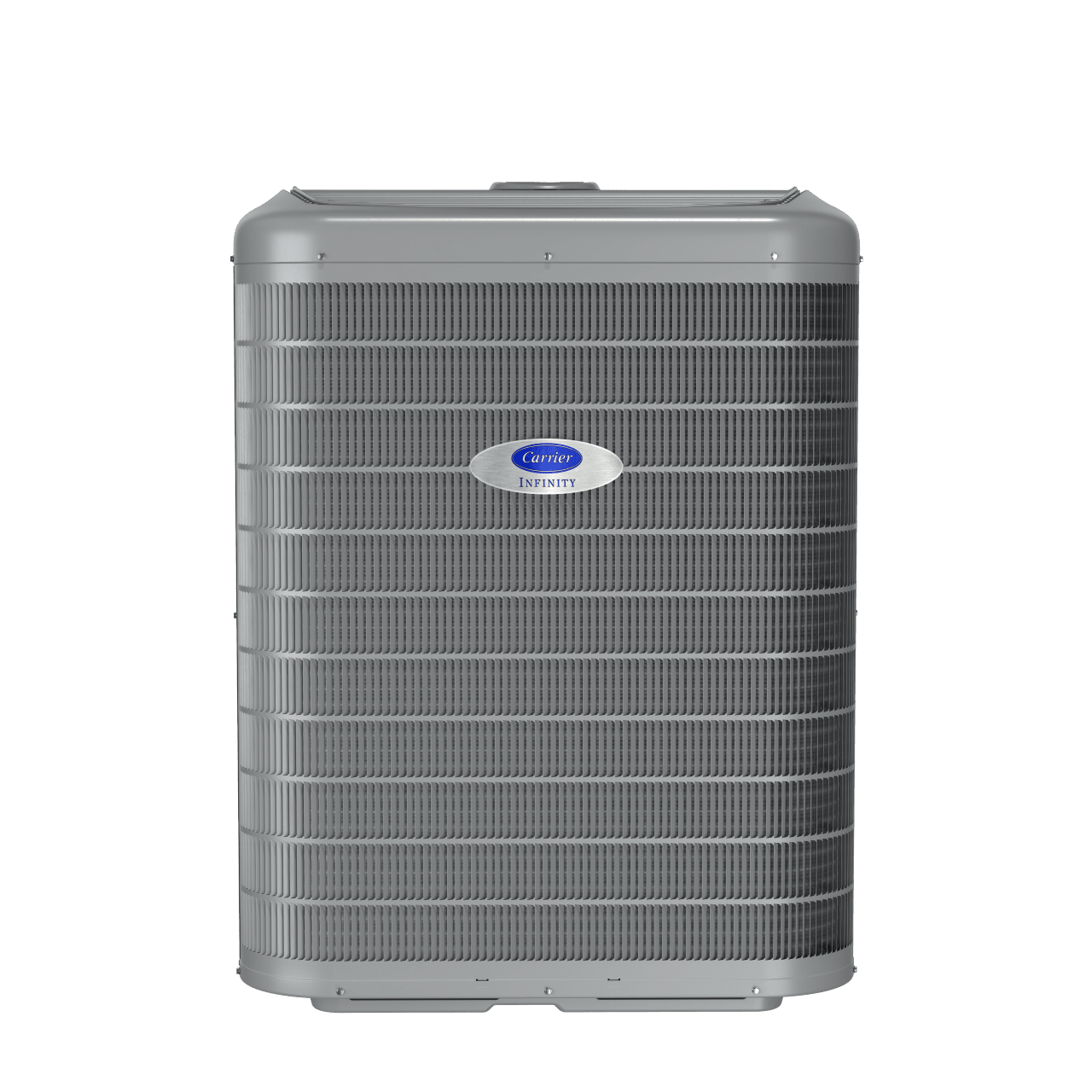What Size Air Conditioner Do I Need?
Home air conditioning systems are available in three main categories: traditional split-system air conditioners, packaged air conditioners and ductless systems. Each of these operate by the same basic process to lower the temperature and dehumidify the air in our homes. They all require an evaporator coil, a condenser coil, a compressor and refrigerant to essentially pull heat and humidity out of the home while returning cooler air to your living spaces. Regardless of which type of system works best for your home, correctly sizing it will provide the best results in comfort, performance and energy-efficiency. For most people, determining the proper size will be best handled by a professional HVAC contractor who can recommend the best air conditioner for your home.

An HVAC contractor will understand the variables involved and be able to perform the cooling load calculations necessary for proper air conditioner sizing. However, understanding some of the principles behind cooling system sizing and the reasons why it’s so important will be helpful when considering a new system for your home. For example, when it comes to the size of your home air conditioner, size matters and bigger is not necessarily better. Equipping your space with a larger system with too many tons of cooling capacity not only uses more energy than necessary which will raise your electric bill, but an oversized air conditioner could also cycle on and off too quickly without adequately removing humidity from the air, leaving you feeling cool but damp. Conversely, an air conditioner that’s too small for your space will work overtime trying to cool the space, consuming more energy without fully doing the job. A properly sized air conditioner matched to the unique needs of your home will not only keep you comfortable, it can also help you save on your energy bills. Because there is no simple answer to the question, “What size air conditioner do I need?” and because it is so important to your comfort and energy consumption, we always recommend getting a professional assessment of your property. Your local Carrier HVAC dealer can account for all of the factors involved and determine the optimal AC unit size for your home.
How Are Air Conditioners Rated?
Air conditioners are typically rated two ways: cooling capacity and energy efficiency. When you ask the question, “what size AC unit do I need?” you’ll be interested in cooling capacity as measured in BTU or tons. To compare energy efficiency between different AC units, you’ll usually look for the SEER2, or Seasonal Energy Efficiency Ratio 2, which is kind of like the air conditioner version of miles per gallon for a car.
Cooling Capacity
Cooling capacity offers a concrete measure to help determine whether a particular air conditioner is an appropriate fit to cool your home. An air conditioner’s cooling capacity is expressed in BTUh (British Thermal Units per Hour) or tons (often referred to as “tonnage”). Both offer a measurement of an air conditioner’s cooling ability over an hour’s time. One ton of cooling capacity is equal to 12,000 BTUh. Residential air conditioners usually range from 1.5 to 5 tons (or, 18,000 – 60,000 BTUh). Anything with larger cooling capacity would be considered light commercial. Tonnage ratings are typically expressed in increments of .5 tons, so residential air conditioners are usually rated as 1.5, 2, 2.5, 3, 3.5, 4, 4.5 or 5 ton units. It should be noted that there is a distinct difference between BTU and BTUh. BTU, or British Thermal Units, is actually a measurement for the amount of heat needed to raise one pound of water by one degree Fahrenheit. BTUh represents a measure of how much heat in BTUs an air conditioner can remove from your home over an hour’s time.
SEER2 Rating
Air conditioners use SEER2 ratings to indicate energy efficiency. SEER2 stands for Seasonal Energy Efficiency Ratio 2 and is used to help consumers make informed choices about the systems they choose for their homes. By definition, SEER2 ratings are the total amount of cooling provided during the entire cooling season divided by the total electrical input during the cooling season. Much like MPG (miles per gallon) for a car, the higher the SEER2 rating, the more energy efficient the system. Bear in mind, two AC units with the same cooling capacity could have very different SEER2 ratings. For example, when looking at two different 3-ton air conditioner models, one might be rated at 13 SEER2, and the other might be a much more efficient 19 SEER2 unit. Higher efficiency units may receive special certification called ENERGY STAR®, a Department of Energy program that recognizes consumer products for their energy saving capabilities. If an AC unit has earned an ENERGY STAR® certification, it has a higher SEER2 rating and uses at least 8% less energy than conventional models. [1]
What Size Air Conditioner Do I Need For My Space?

While there are formulas available to help you estimate the right sized AC unit for your home, the easiest and most accurate method is to rely on a Carrier® HVAC dealer. They’ll be able to precisely measure your home, weigh each of the factors that go into the equation, and provide an accurate assessment of the right-sized equipment for your home.
Air Conditioner Size Calculation
To determine the best fit for an HVAC system for your home, your local dealer will perform what is called a “load calculation”. This will tell you the amount of cooling capacity required to maintain a consistent temperature within the home. Your dealer will compile information like square footage, window and door area, insulation quality and climate to figure out just how much heating capacity and cooling capacity is required by your system.
Additional Variables For Air Conditioner Sizing
Choosing the right size matters and there are many variables that must be taken into consideration when determining the correct size air conditioner for your home. Factors that your dealer will take into consideration include:
- Total square footage of interior space to push the cool air into
- Approximate amount of direct sun exposure
- Head count of typical number of people at home
- Types and numbers of appliances or equipment that generate heat
- Weather conditions/climate
- Quality and total number of exterior windows
- Quality and R-value of insulation
- Type of construction, such as brick exterior or vinyl siding
- Interior ductwork/airflow assessment
- Features that contribute to heating & cooling loss or gain, such as fireplaces, ceiling height or skylights
AC Unit Calculator
- Home square footage and room-by-room measurements
- Number of floors and ceiling heights
- Insulation quality and type
- Number, size, type, and orientation of windows and doors
- Estimated air leakage through windows, doors, and other openings.
- Number of occupants and their typical usage patterns.
- Historical weather data, including temperature and humidity
- Length, size, and insulation of ductwork, as well as any potential leakage.
Contact a Carrier HVAC Dealer For Help With What Size AC Unit Do I Need
Let a Carrier HVAC dealer answer your question of “what size AC unit do I need?” Carrier dealers have the training and experience to accurately measure and calculate the correct cooling load for your home. Armed with this information, you’ll be able to make a better informed decision on an HVAC system that will provide comfortable, energy-efficient cooling for you and your family at an air conditioner price you are comfortable with.

Explore Carrier Air Conditioners
Up to 21 SEER2 for premium energy savings with premium comfort features
Up to 16.5 SEER2 for enhanced energy savings with standard comfort features.
Up to 16.5 SEER2 for enhanced energy savings with standard comfort features.
Frequently Asked Questions About What Size Air Conditioner You Need For Your Home
A 2.5-ton AC unit provides 30,000 BTUs of cooling capacity per hour as 1 ton of cooling = 12,000 BTUs per hour. The Department of Energy states each 12,000 BTU incremental should be enough to cool 400-500 square feet, but with proper sealing and insulation in a home, that AC unit could cool up to 1,000 square feet per 12,000 BTU. Your local Carrier dealer can calculate the exact AC size and tonnage your home needs.
A 2-ton AC unit provides 24,000 BTUs of cooling capacity per hour as 1 ton of cooling = 12,000 BTUs per hour. As a rule of thumb, the Department of Energy states each 12,000 BTU incremental should be enough to cool 400-500 square feet, but with proper home sealing and insulation, that unit could condition up to 1,000 square feet per 12,000 BTU. Call a Carrier dealer to learn what exact AC size and tonnage your home needs.
A 4-ton air conditioner generates 48,000 BTUs of cooling capacity per hour as 1 ton of cooling = 12,000 BTUs per hour. As a general guideline, the Department of Energy says that each 12,000 BTU incremental should be sufficient for 400-500 square feet, but if the house is sealed and insulated well that unit could condition, up to 1,000 square feet per 12,000 BTU. Schedule an appointment with a Carrier contractor to determine the precise tonnage and size of your home’s AC.
- What is a Split System?
- Help with Air Conditioner Fan Not Working
- Common reasons for Air Conditioner Not Cooling House
- Learn All About Air Filters
- Tips to Unclog Air Conditioner Drain Line
- Learn How to Troubleshoot an Air Conditioner
- Find Out How Do Air Conditioners Work
- What is a Split System HVAC?
- What is Central Air and How does it Work?
- Air Conditioner Price; How much do they cost?







